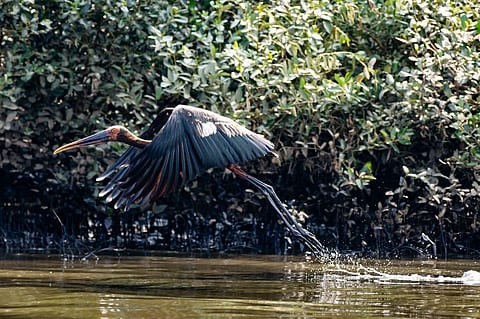

CHENNAI: The oil spill is taking a heavy toll on the already degraded environmental ecosystem, including mangrove cover and wetlands, in Ennore. Now, the sightings of 'black' oil-drenched Pelicans and Painted Storks raises concern of bird mortality as the annual migration season is peaking.
The local fishermen said around 60 pelicans had died during the initial few days of oil spill, the stronger individuals, who survived despite coming in contact with the toxic oil, stand testimony to how badly the birdlife was affected.
The southern bench of National Green Tribunal (NGT), which heard the case on Monday, asked for a biodiversity loss report from the forest department by December 21.
Supriya Sahu, Additional Chief Secretary, Environment, Climate Change and Forests Department, told TNIE: "It's heartbreaking to see this (oil-drenched bird pics). We have left no stone unturned to minimise the impact. A rapid biodiversity impact assessment has been completed and the government is roping-in experts from National Centre for Coastal Research (NCCR) and National Institute of Oceanography (NIO) to carry out intermediate and long-term bio-remediation."
NCCR will do the sediment analysis and a team from NIO Goa is arriving in Chennai in two days to assess and if required carry out a pilot bio-remediation works. "Oil deposits are found roughly in 60 hectares of mangroves and core sampling is being done in 50 locations. We have to be careful before attempting clean-up the mangrove area, which is why experts are being engaged to suggest the best way forward."
Forest officials said the oil spill is unlikely to have little or no impact on fast-approaching Olive Ridley turtle nesting as beaches remained largely unaffected, however its impact on birds is a concern.
M Yuvan, bird expert from Madras Naturalists Society, said the impact on birds would be profound, especially pelicans, which happen to be Chennai's largest waterbird. "It feeds by dip-netting - plunging its neck and beak into the water, filling it then filtering it for fish and other creatures. A few days after the floods, that coincided with the oil spill - black and oil-drenched Pelicans (usually white/greyish) have been spotted in Ennore and across the Chennai- Adyar estuary, Pallikaranai, Cooum etc."
Ennore is a roosting and foraging spot for hundreds of Pelicans. Oil in bird feathers makes them stick together and negates their natural hydrophobic nature - putting the birds in mortal danger. "Oil also makes them hypothermic. In all historical oil spills, bird deaths have been massive in numbers - especially waterbirds," he said.
Experts have called for a comprehensive assessment of the impact of this oil spill on birdlife.
In recent years, Pelicans have begun nesting on the pylon towers of the Ennore area and their nests have
been increasing each year. Other bird species found in abundance at Ennore are the Painted storks, which like Pelicans are near threatened. Migratory birds that flock to Ennore's oyster reefs are Brown-headed gulls, various species of Waders and Terns.